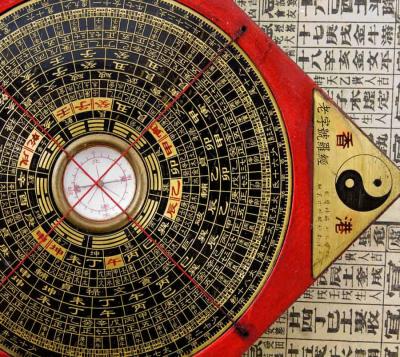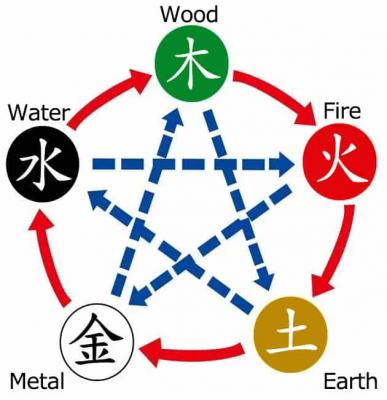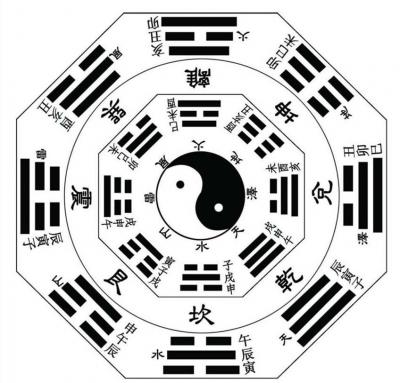Chinese Feng Shui
What is Feng Shui
Feng Shui (pronounced fung shway) is an ancient Chinese philosophy of understanding the energy that surrounds us and it deals with using positive 'chi' (qi or energy) to improve a person's well being, fortune and success. Feng shui is often identified as a form of geomancy, divination by geographic features, but it is mainly concerned with understanding the relationships between nature and ourselves so that we might live in harmony within our environment.

Feng Shui teaches us how to create harmony and balance around us. It is a great treasure of traditional Chinese culture. Literally translated from Chinese, Feng Shui means wind and water, "the way of wind and water" or "the natural forces of the universe". Put simply, Feng Shui is the art and science of capturing Qi with water and moving it with wind.
Fengshui combines the trinity of the Heaven, the Earth and humans, and seeks harmony between selected site, orienting, natural doctrine and human fate. It repulses human destruction of nature and stresses cohabitation with the environment, which is regarded as perfect and occult. The underlying principle of Feng Shui is to live in harmony with your environment so that the energy surrounding you works for you rather than against you. After all, why swim against the tide?
What is Chi in Feng Shui?
Chi (Chinese: 气, pronounced chee) is also spelled as “Qi” or “Ki”. Translated from Chinese, chi literally means breath. In Feng Shui, chi is the Chinese word for universal energy or life force. Inherent to all matter, Qi permeates our bodies, minds, and spirits. Its presence can be felt in nature, in our homes and workplaces.
The modern practice of Feng Shui is often focused on keeping chi energy balanced in your home, office, or other structures to harness the positive chi present in your environment and convert it into personal energy for health, harmony, and happiness.
The Five Elements of Feng Shui
Ancient Chinese philosophers believed that everything in the universe has two opposing but deeply interconnected energies – yin (阴) and yang (阳).

The evolution of yin and yang can be divided into five basic dynamics: wood (representing growth), fire (representing destruction), earth (representing fusion), metal (representing gathering), and water (representing infiltration). The Five Elements Theory is used to explain the formation of all things in the world and their interrelationships.
Feng Shui, the ancient Chinese practice of arranging your space to create harmony in your everyday life, is said to bring health and prosperity. The key to practicing Feng Shui successfully is finding the proper balance between these five Feng Shui elements. For example, the kitchen door should not be opposite the bathroom door. The kitchen represents fire and the bathroom water. The incompatibility of water and fire will lead to disharmony between husband and wife.
Productive Cycle of the Five Feng Shui Elements
Dustructive Cycle of the Five Feng Shui Elements
The Five Feng Shui Elements and Their Corresponding Areas
| Element | Qualities | Colors | Season | Direction(s) | Shape |
|---|---|---|---|---|---|
| Wood | Growth, expansion, vitality | Green, teal | Spring | East, southeast | Rectangle |
| Fire | Passion, emotion | Red, pink, orange, purple | Summer | South | Triangle |
| Earth | Stability, grounding | Yellow, brown, tan | Transitions between the seasons | Center, northeast, southwest | Square |
| Metal | Clarity, precision, efficiency | White, gray, metallic | Autumn | West, northwest | Circle |
| Water | Wisdom, relaxation, flexibility | Black, blue | Winter | North | Curvy |
Feng Shui Bagua Map
Bagua (Chinese: 八卦, also called pakua or bagua map) is an ancient Chinese Taoist Philosophy. Yin and Yang are two opposing forces that make up this concept. Bagua is a tool used in Chinese culture to deduce the relationship between various things in the world, space, and time, along with Yin Yang and Wuxing (the Five Elements).
Bagua, literally translated as the "eight trigrams", "eight symbols" or “eight areas” is also a Feng Shui energy map. Chinese people apply the Bagua Map to practical daily life. Traditional Chinese Feng Shui schools use the Manifested Bagua Map (also known as the Bagua of King Wen or Later Heaven Bagua) and Flying Stars chart to enhance and optimize good luck in your home or office for a better future and trial times in life.
The Manifested Bagua and Corresponding Areas
| Name | Nature | Direction | Season | Family |
|---|---|---|---|---|
| Li (离) | Fire | South | Summer | Middle Daughter |
| Kun (坤) | Earth | Southwest | Summer | Mother |
| Dui (兑) | Metal | West | Autumn | Youngest Daughter |
| Qian (乾) | Metal | Northwest | Autumn | Father |
| Kan (坎) | Water | North | Winter | Middle Son |
| Gen (艮) | Earth | Northeast | Winter | Youngest Son |
| Zhen (震) | Wood | East | Spring | Eldest Son |
| Xun (巽) | Wood | Southeast | Spring | Eldest Daughter |
If you don't have a rectangular or square home, you'll probably notice that it doesn't fit well into the Feng Shui Bagua Map. In fact, most homes don’t fit well very into the Feng Shui Bagua Map. The Bagua Map is sometimes depicted as an octagon, other times a nine-square grid. Feng Shui practitioners usually apply the Manifested Bagua Map to a home’s floor plan to see whether there are missing areas that need remediation.
History of Feng Shui
Feng Shui has been around since the Bronze Age. Its first mention in text is reported to be 220 B.C. Feng Shui believes that the earth is a living thing and has life and energy. The energy or Qi of a site depends on its topography and its physical surrounding. A site with revitalizing energy is healthy and a site with bad energy was damaging to those who lived on it. Ever since then it has been incorporated into traditional Chinese architecture and has been followed by the rich and poor alike. In ancient China a city was planned in concentric rectangles surrounded by walls surrounded by lakes, hills, valleys, gardens, courtyards and parks. Chinese tried to ensure that both the natural and the built environment were planned to enhance positive energy.
Emperors build grand palaces and buildings from the time of the Shang dynasty (1711-1066 BC). Chinese emperors were considered sons of heaven and used to the principles of Feng Shui while building their palaces to create an environment favorable to power. The principles of Feng Shui created harmony between the forces of nature and this influenced man therefore the emperors ensured the principles of Feng Shui were followed when they built their palaces.
Principles of Feng Shui
Following simple principles of Feng Shui can change your life for the better. According to Feng Shui, people may be affected for better or worse by their surroundings. By manipulating and arranging surroundings you can attract positive vital energy. You must believe and have faith in the principles of Feng Shui and you can fulfill your dreams and goals. When you use principles of Feng Shui in your home or office, you are telling God or whatever power you believe in exactly what you want. And thus you are making a very powerful statement. One of the basic principles of Feng Shui is positive energy attracts positive energy. So if you have positive thoughts then positive things will happen to you.
The success of Feng Shui depends on your intentions and constant attention. You have to forget negative beliefs and this will help you overcome the obstacles that are preventing positive things from happening to you. You should think only of things that you want to happen to you and not about negative things. Positive energy attracts positive energy. Remember to be grateful for everything you have. If you do this you will get great returns from unexpected quarters.
It may take years to master Feng Shui, because this is not something that one can do by simply reading some books. But the principles of Feng Shui are grounded in common sense and practicality. Thus following a few simple rules of Feng Shui you can improve the surroundings in which you live.
1. Observe and become aware about your surroundings. Always follow the rules of nature.
2. As Feng Shui deals with wind and water and this is symbolic of the energy flowing in the place we live, Feng Shui is a means of harness Chi energy.
3. It is important to harness positive energy and allow it to flow freely. Remove all obstacles and creates more open space. Ensure that there is no obstacle especially when you enter a room, as it will obstruct the smooth flow of energy through the room.
4. According to Feng Shui, when you arrange your room it should be done in such a way that you can see anyone who is entering the room. It is not possible in a particular room then the place a mirror opposite the door so that it will enable you to see whoever is entering the room.
